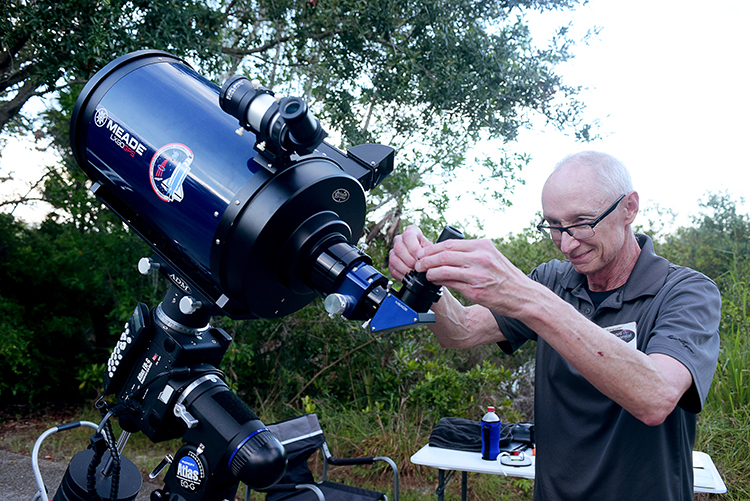More than 200 astrophiles gathered under the stars at the Environmental Learning Center for an out-of-this-world evening at the recent Perseid Meteor Shower & Star Party. Viewers left the campus better able to experience and observe the meteors at their peak visibility the following week.
The ELC, located on an island in the middle of the Indian River Lagoon, has as its primary mission the goal of creating active stewards of the environment, and by doing so, enhance their own well-being.
Although the ELC is primarily a daytime destination, an ideal place to explore native flora and catch glimpses of local fauna, this time all eyes were turned skyward to search out stars, meteors and other celestial bodies.
“Everything we do is about connecting people to the natural world, so they have an appreciation for it. While a lot of the things we do are water- and land-related, we do space-related things as well,” said Barbara Schlitt Ford, ELC executive director.
She noted that the meteor shower event allowed them to invite the community out for a rare nighttime excursion. “We wanted to bring folks out to campus and connect them to the outer limits of our natural world,” added Ford.
As people waited for the sun to go down and the stars to come out, early birds could grab dinner from the On the Hook food truck and cool off with ice cream from Yami’s, before heading out to explore the 64-acre nature center and choose their optimal viewing spot.
Others opted to visit the Touch Tank in the Discovery Station, view environmental artwork by local artists, or just explore the campus. The celestial evening also included such space-themed activities as storytime and crafts, and guest speaker Ken Verderame gave an in-depth talk on the vastness of the universe.
Members of the International Dark- Sky Association shared information on protecting the night sky from light pollution, which can impact the health of humans and wildlife, and contribute to climate change.
Volunteers from the Brevard Astronomical Society were on hand to answer questions and offer the use of high-powered telescopes to give inquiring minds a close-up look at the night sky. Lucky viewers could spy Saturn’s rings, Jupiter’s moons, meteors and constellations.
After a busy summer with campers, Ford said that the Discovery Station and Touch Tank will be closed for several weeks as an eco-flooring system is installed, featuring illustrations of local ecosystems hand-painted by Crystal Ploszay, CEO of Unicorn Epoxy.
During the month of October, the Pelican Island Conservation Society Bird and Nature Art Show will be on display in both ELC galleries.
For more information, visit discoverelc.org.
Photos by Brenda Ahearn

